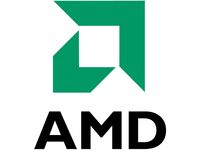AMD Concedes to Intel's Atom
Those of us who were hoping to see AMD enter the race against Intel’s Atom processor are disappointed to see no such thing unfold today.
Instead of unveiling a processor that could stand up against Intel’s power miserly Atom, which is at the heart of every netbook worth mentioning, AMD turned its attention to the slightly more upscale ultraportable market.
AMD introduced two new ultraportable notebook platforms, Congo and Yukon. AMD materials describe Congo as based upon the dual-core “Conesus” CPU with the RS780M and SB710 chipset; and Yukon is based upon a single-core CPU with the RS690E and SB600 chipset. Both platforms aim to provide more capability and power to users “who are dissatisfied with the limited experience offered by mini-notebooks.”
Yukon will have a thermal design power value of 25 W (both processor and chipset), making it incomparable to the Intel Atom. Yukon is planned to be available in the first half of 2009, while Congo will appear in the latter half.
By 2010, AMD’s ultraportable platform will be “Nile,” a dual-core “Geneva” CPU utilizing DDR3. In 2011, AMD plans to introduce the dual-core “Ontario” APU (that’s Accelerated Processing Units) for ultraportable and mini-notebook platforms.
It should be clear by now that Intel has successfully cornered the netbook market with its impressive Atom processor – a claim that AMD will leave to its competitor uncontested.
“Atom is targeting markets we’re not even [going] after,” AMD said, in a comment recorded by Notebooks.com, adding that Yukon will offer a more ‘complete’ PC experience.
Get Tom's Hardware's best news and in-depth reviews, straight to your inbox.
Bahr Mahoney, director of AMD’s mobile division, said that the company won’t be going after the netbook market as volume is dramatically in favor of more powerful machines. Mahoney also added that AMD will not offer specific solutions for the business user. “We don’t offer the ultimate in the battery life that some of the enterprise customers are looking for in enterprise ulramobiles,” said Mahoney.
-
AMD : "Actually we suck at CPUs these days , we just don't want to fight another Intel CPU" , oh well , giving up without even a fight.Reply
And what about VIA , they seemed to have a good CPU , the Nano , and they seemed proud of it but I haven't seen it anywhere , it's full of those old and oh so poor performing C7. Then again VIA was never good at anything , too bad though , this would have been their chance to grab a bigger margin in the CPU market.
Then again it seems ARM is going after Intel in the netbook market and they seem to be using Linux so things will certainly get interesting. -
kelfen Pei-chenDon't worry. AMD still has the OLPC market in Africa and South Asia.That made me laugh but odly it is so true!Reply -
stinkygood I really don't understand AMD rationale. They want to try and compete with Intel who can far out spend, out fabricate, and out market them, and ignre the low hanging fruit of low power processors. How much resources would it take to build a low power CPU that offers just decent performance. I would think this is one area where AMD might have an advantage with a better chipset & integarted graphics solution.Reply
-
fazers_on_stun ^ I'd say AMD's problems is that they have to react not only to Intel's initiatives (when they should be proactive) but also the economy, a mountain of debt and lost credibility. So that is why their gameplan does a 180 degree turnaround every Analysts Day :). If you recall, Bulldozer & Bobcat got hauled to the scrapheap last year and now Bulldozer is back on the schedule this year, only pushed out a year.Reply
Hopefully the Abu Dhabi spinoff will give them some breathing room the next couple of years. -
malveaux Hrm,Reply
I have no problem with AMD. I like spending $80 for an AMD6000+ compared to the double cost INtel has. Performance? Too close to care in REAL WORLD use and at half the cost, I'm sold.
Kthx.
Very best, -
hellwig I'm confused, is AMD going after Centrino with these new platforms, and therefore their own Puma platform?Reply
Exactly what market are they going for here? Most UMPCs that don't run Atoms already run Core 2's, so they won't exactly offer a performance increase there either. -
Shadow703793 ReplyYukon will offer a more ‘complete’ PC experience.
True, Intel Atom is very limited in performance. If AMD could drop down the TDP to 15-20W then they would be able to compete with Atom on a performance per Watt basis. -
Shadow703793 Just found this: http://news.cnet.com/8301-13924_3-10096494-64.htmlReply
The tech specs that AMD is currently disclosing for Yukon/Congo are a sub 25-watt platform (processor and chipset) with single and dual-core options. Currently, its mainstream Turion processors operate at over 30 watts. (Correction: the "sub 25-watt" Yukon/Congo refers to both the processor and chipset.)
So AMD dose have quite a good chance as Intel Atom's total power draw is quite high due to the chipset Intel pairs Atom with (see: http://www.tomshardware.co.uk/Atom-Athlon-Efficient,review-31253-5.html ) -
jamesl malveauxHrm,I have no problem with AMD. I like spending $80 for an AMD6000+ compared to the double cost INtel has. Performance? Too close to care in REAL WORLD use and at half the cost, I'm sold.Kthx.Very best,Reply
ha ! keep dreaming
when are you amd people gonna stop with this "amd is cheaper nonsense?" especially the nonsense that equivalent intel chips cost 2x as much
you can get a great intel chip for $83, and that's cheaper than the amd6000+
http://www.newegg.com/Product/ProductList.aspx?Submit=ENE&N=2010340343%2050001157%204027&bop=And&Order=PRICED
http://www.newegg.com/Product/ProductList.aspx?Submit=ENE&N=2%2050001028%2040000343%204027&name=%2475%20-%20%24100
and for less than 30% more the amd 6000+ you can get an intel e7300
http://www.newegg.com/Product/ProductList.aspx?Submit=ENE&N=2010340343%2050001157%204017&bop=And&Order=PRICE
you're better off going with intel
http://www.xbitlabs.com/articles/cpu/display/core2duo-e7300-pdc-e5200_6.html#sect0

